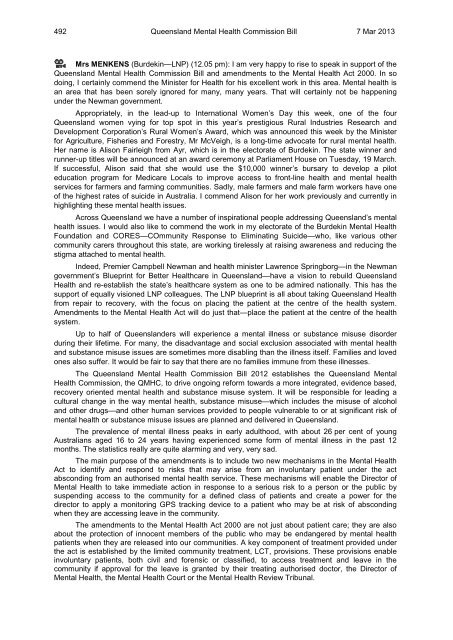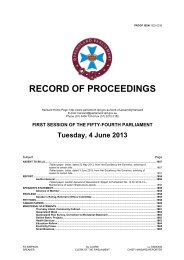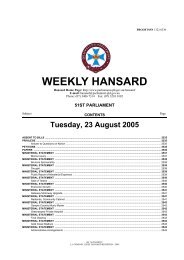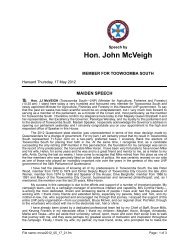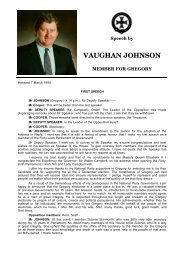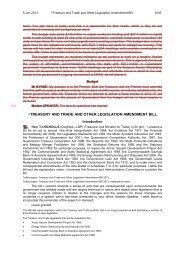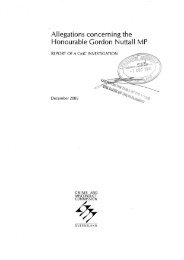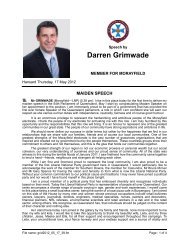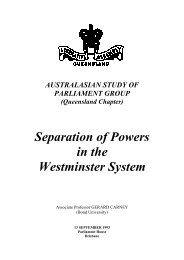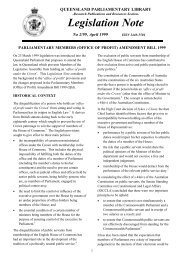RECORD OF PROCEEDINGS - Queensland Parliament ...
RECORD OF PROCEEDINGS - Queensland Parliament ...
RECORD OF PROCEEDINGS - Queensland Parliament ...
You also want an ePaper? Increase the reach of your titles
YUMPU automatically turns print PDFs into web optimized ePapers that Google loves.
492 <strong>Queensland</strong> Mental Health Commission Bill 7 Mar 2013<br />
Mrs MENKENS (Burdekin—LNP) (12.05 pm): I am very happy to rise to speak in support of the<br />
<strong>Queensland</strong> Mental Health Commission Bill and amendments to the Mental Health Act 2000. In so<br />
doing, I certainly commend the Minister for Health for his excellent work in this area. Mental health is<br />
an area that has been sorely ignored for many, many years. That will certainly not be happening<br />
under the Newman government.<br />
Appropriately, in the lead-up to International Women’s Day this week, one of the four<br />
<strong>Queensland</strong> women vying for top spot in this year’s prestigious Rural Industries Research and<br />
Development Corporation’s Rural Women’s Award, which was announced this week by the Minister<br />
for Agriculture, Fisheries and Forestry, Mr McVeigh, is a long-time advocate for rural mental health.<br />
Her name is Alison Fairleigh from Ayr, which is in the electorate of Burdekin. The state winner and<br />
runner-up titles will be announced at an award ceremony at <strong>Parliament</strong> House on Tuesday, 19 March.<br />
If successful, Alison said that she would use the $10,000 winner’s bursary to develop a pilot<br />
education program for Medicare Locals to improve access to front-line health and mental health<br />
services for farmers and farming communities. Sadly, male farmers and male farm workers have one<br />
of the highest rates of suicide in Australia. I commend Alison for her work previously and currently in<br />
highlighting these mental health issues.<br />
Across <strong>Queensland</strong> we have a number of inspirational people addressing <strong>Queensland</strong>’s mental<br />
health issues. I would also like to commend the work in my electorate of the Burdekin Mental Health<br />
Foundation and CORES—COmmunity Response to Eliminating Suicide—who, like various other<br />
community carers throughout this state, are working tirelessly at raising awareness and reducing the<br />
stigma attached to mental health.<br />
Indeed, Premier Campbell Newman and health minister Lawrence Springborg—in the Newman<br />
government’s Blueprint for Better Healthcare in <strong>Queensland</strong>—have a vision to rebuild <strong>Queensland</strong><br />
Health and re-establish the state’s healthcare system as one to be admired nationally. This has the<br />
support of equally visioned LNP colleagues. The LNP blueprint is all about taking <strong>Queensland</strong> Health<br />
from repair to recovery, with the focus on placing the patient at the centre of the health system.<br />
Amendments to the Mental Health Act will do just that—place the patient at the centre of the health<br />
system.<br />
Up to half of <strong>Queensland</strong>ers will experience a mental illness or substance misuse disorder<br />
during their lifetime. For many, the disadvantage and social exclusion associated with mental health<br />
and substance misuse issues are sometimes more disabling than the illness itself. Families and loved<br />
ones also suffer. It would be fair to say that there are no families immune from these illnesses.<br />
The <strong>Queensland</strong> Mental Health Commission Bill 2012 establishes the <strong>Queensland</strong> Mental<br />
Health Commission, the QMHC, to drive ongoing reform towards a more integrated, evidence based,<br />
recovery oriented mental health and substance misuse system. It will be responsible for leading a<br />
cultural change in the way mental health, substance misuse—which includes the misuse of alcohol<br />
and other drugs—and other human services provided to people vulnerable to or at significant risk of<br />
mental health or substance misuse issues are planned and delivered in <strong>Queensland</strong>.<br />
The prevalence of mental illness peaks in early adulthood, with about 26 per cent of young<br />
Australians aged 16 to 24 years having experienced some form of mental illness in the past 12<br />
months. The statistics really are quite alarming and very, very sad.<br />
The main purpose of the amendments is to include two new mechanisms in the Mental Health<br />
Act to identify and respond to risks that may arise from an involuntary patient under the act<br />
absconding from an authorised mental health service. These mechanisms will enable the Director of<br />
Mental Health to take immediate action in response to a serious risk to a person or the public by<br />
suspending access to the community for a defined class of patients and create a power for the<br />
director to apply a monitoring GPS tracking device to a patient who may be at risk of absconding<br />
when they are accessing leave in the community.<br />
The amendments to the Mental Health Act 2000 are not just about patient care; they are also<br />
about the protection of innocent members of the public who may be endangered by mental health<br />
patients when they are released into our communities. A key component of treatment provided under<br />
the act is established by the limited community treatment, LCT, provisions. These provisions enable<br />
involuntary patients, both civil and forensic or classified, to access treatment and leave in the<br />
community if approval for the leave is granted by their treating authorised doctor, the Director of<br />
Mental Health, the Mental Health Court or the Mental Health Review Tribunal.


